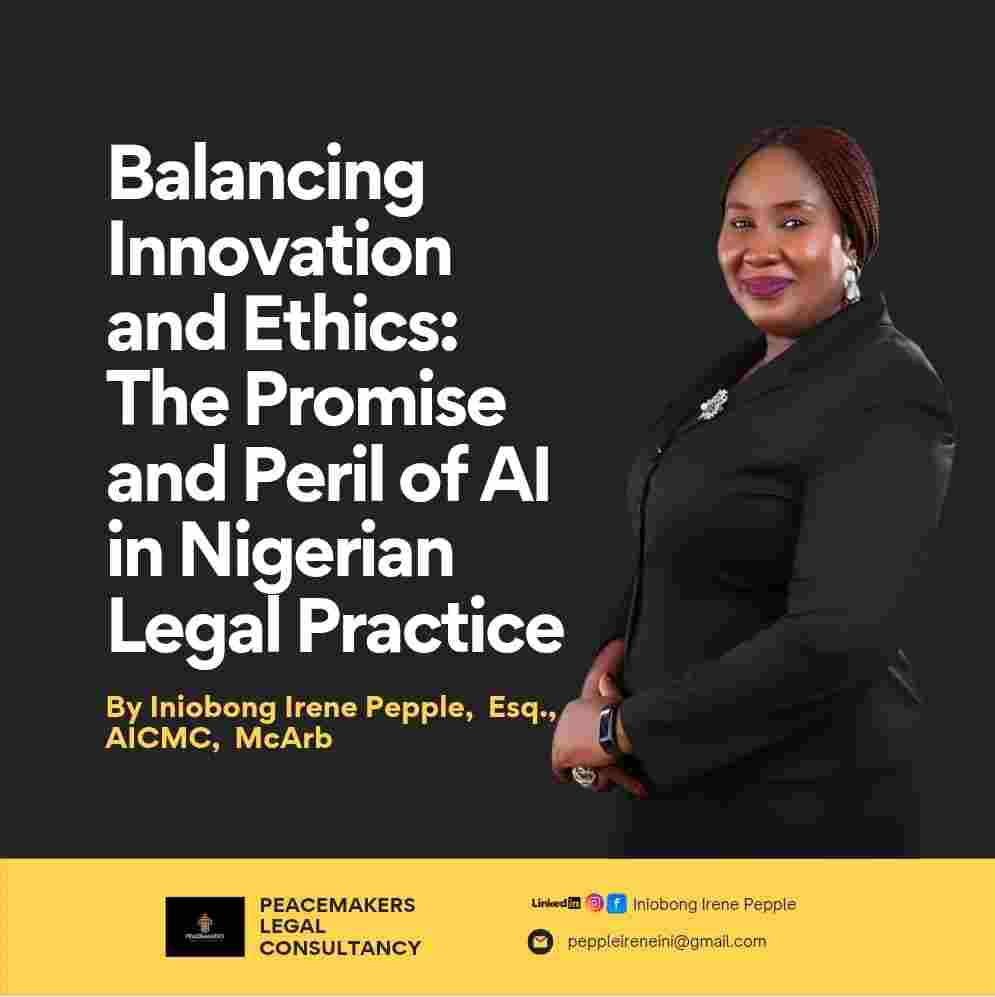By Iniobong Irene Pepple, Esq., AICMC, McArb
Artificial Intelligence (AI) is steadily reshaping industries across the world, and the legal profession in Nigeria is not left out. From contract review to predictive analytics, AI-powered tools are gradually becoming part of the lawyer’s toolbox. Yet, while its benefits are promising, its pitfalls are equally pressing. For Nigerian lawyers, the key lies in striking a balance between innovation and ethical responsibility.
The Promise of AI in Legal Practice
- Efficiency and Time-Saving
AI can process thousands of pages of documents, contracts, or case law within minutes, tasks that could otherwise consume days of human labor. This allows lawyers to focus on what matters most: strategy, advocacy, and client engagement.
- Improved Legal Research
AI-driven research platforms can comb through Nigerian statutes, judicial precedents, and regulations quickly, providing more comprehensive insights and reducing the risk of missing critical authorities.
- Cost Reduction for Clients
By automating repetitive and low-value tasks, AI can help law firms cut costs, making legal services more affordable to individuals and small businesses.
- Predictive Analytics
By studying trends in judicial decisions, AI can help lawyers estimate the likelihood of particular case outcomes; an invaluable tool for managing client expectations and strategic planning.
- Enhanced Client Service
Chatbots and virtual assistants are increasingly being deployed to handle routine queries, schedule appointments, and provide updates, improving responsiveness and client satisfaction.
The Perils of AI in Legal Practice
- Job Displacement
With AI taking on research and document review, young lawyers and paralegals face shrinking entry-level opportunities; the very roles that have traditionally provided training grounds.
- High Implementation Costs
The technology comes at a steep price. Many small and mid-sized law firms in Nigeria may struggle to afford AI tools and the infrastructure they require.
- Lack of Local Adaptation
Many AI solutions are built for foreign jurisdictions. Without tailoring to Nigerian law and practice, their usefulness can be limited, and errors more likely.
- Confidentiality Concerns
AI systems often process sensitive client information. Feeding such data into unsecured or foreign platforms could expose clients to breaches, contravening professional obligations.
- Over-Reliance and Errors
AI tools are prone to “hallucinations”—fabricating cases or misinterpreting statutes. Lawyers who accept outputs uncritically risk making serious professional blunders.
Ethical Boundaries: The Rules of Professional Conduct (RPC) 2023
The promise and peril of AI must be considered in light of lawyers’ ethical duties. Misuse of AI could violate the Rules of Professional Conduct 2023.
Rule 14(1) & (2): Dedication to Clients
Lawyers must act with diligence, warn clients of risks, and provide honest advice. Blind reliance on AI without verification can breach this duty.
Rule 16: Competence
Lawyers must not neglect a matter or handle cases without adequate preparation. Delegating substantive reasoning to AI without scrutiny may amount to incompetence.
Rule 19: Confidentiality
Client communications are privileged. Uploading documents into unsecured AI systems can expose secrets and put the lawyer in breach of confidentiality.
The takeaway is clear: AI may assist, but it can never replace the lawyer’s judgment, discretion, and ethical responsibility.
Looking Ahead: The NBA’s Position
At the 65th Annual General Conference of the Nigerian Bar Association (NBA) held in Enugu under the leadership of Mazi Afam Osigwe, SAN, the communique issued struck a balanced tone. The NBA acknowledged that while AI adoption is inevitable, its challenges and limitations must be recognized.
On the future of AI in legal practice, the NBA resolved to:
Lead structured engagement on AI by developing ethical and professional guidelines to prevent abuse.
Roll out continuous professional training to ensure Nigerian lawyers are equipped to integrate AI responsibly.
Conclusion
Artificial Intelligence holds both promise and peril for Nigerian legal practice. It can enhance efficiency, improve client service, and broaden access to justice, but it also poses risks of incompetence, ethical breaches, and data insecurity. The Rules of Professional Conduct 2023 provide the guardrails lawyers must respect.
The NBA’s recent resolutions show that the profession is alert to both sides of the equation: it is ready to embrace innovation, but not at the expense of ethics. For Nigerian lawyers, the future lies in using AI as a supportive tool; one that amplifies their work while preserving the values and integrity at the heart of legal practice.


